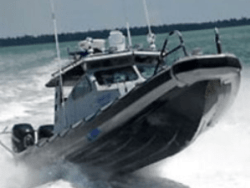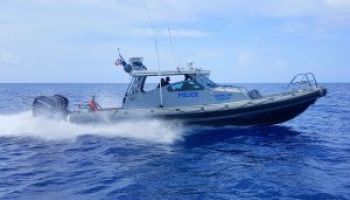Novice smugglers admit carrying 450lbs ganja
Click here to view original web page at caymannewsservice.com
RCIPS Joint Marine Unit (CNS): Four Jamaican nationals, who have been on remand for almost one year after being charged with smuggling ganja, appeared in court for a sentencing hearing Friday, when the judge heard that none of them were experienced seamen. As the facts behind the smuggling charges […]

RCIPS Joint Marine Unit
(CNS): Four Jamaican nationals, who have been on remand for almost one year after being charged with smuggling ganja, appeared in court for a sentencing hearing Friday, when the judge heard that none of them were experienced seamen. As the facts behind the smuggling charges were outlined for the judge, it emerged that they had all been lured into carrying the drug haul after believing they were getting work on a fishing boat.
Martin Anthony Trench, Basil Anthony Smith, Andre Junior Russell and Kendale Jerome Straumann were all charged after the RCIPS Joint Marine Unit and helicopter intercepted the canoe they were on last September 27 miles southeast of Grand Cayman.
Prosecuting counsel Kenneth Ferguson said the boat had tried to speed off when it was spotted by police officers, who saw the men throwing large packages off the boat into the sea as they tried to get away. However, they were successfully stopped and arrested, and the police recovered over 454lbs of ganja from the boat and the water.
Ferguson said that during their interviews with police, the men were “completely mute and did not say a word”. However, after they had all come clean and pleaded guilty their story emerged through social enquiry reports.
Each of the men had a similar story about being recruited for work on board a fishing boat, but all of them admitted that when they arrived at the port the boat was already loaded and they realised pretty quickly what the cargo was. Having been offered $5,000 for the work and fearing they would not be able to refuse, they all opted to press ahead with the smuggling operation.
The men claimed they were destined for Honduras, where they were supposed to liaise with another vessel offshore. But the men, all of whom said they did not know each other until they came on board, said that none of them were experienced sailors that knew how to navigate and had no idea where they were going. They said that when they saw the police helicopter, they panicked and began throwing the ganja overboard and tried to get away.
The court heard that the case has dragged on as a result of a number of different issues relating to the crown’s case and issues with defence attorneys, which is why, despite pleading to the crime within a matter of weeks, they have still not been sentenced.
All of the men were represented at the sentence hearing by Rupert Wheeler, who described the dire financial circumstances all of the men were in when they opted to get in the boat and transport the drugs. Most were either unemployed or in casual work, several had significant debts as a result of family medical bills, one was in debt after being in a car crash and another was the sole bread winner for his own direct and extended family.
Wheeler said they were all motivated to do the smuggling because of money, but not, as had been implied by the crown, as a result of greed but dire circumstances.
However, Justice Marva McDonald Bishop said that poverty cannot be an excuse for crime and if it were “most of Jamaica would be criminals… or everywhere else in the world for that matter”. She sympathized with their plight but pointed out that many people who have nothing don’t resort to crime to meet their needs.
The judge is expected to deliver her sentence verdict next month.

